

This article is an excerpt from the Shortform book guide to "Hyperfocus" by Chris Bailey. Shortform has the world's best summaries and analyses of books you should be reading.
Like this article? Sign up for a free trial here .
Do you get easily distracted? Do you know why your brain finds it hard to focus?
Hyperfocus involves single-tasking for a prolonged period of time. Distractions, which Bailey defines as anything that diverts our attention from our original purpose, thwart our ability to hyperfocus. Therefore, limiting distractions is a critical part of hyperfocus.
We’ll discuss just how bad we are at avoiding distractions and why.
Why We’re Easily Distracted
Bailey highlights how our biological tendencies hamper our ability to do modern-day knowledge work: They make us terrible at avoiding modern-day distractions. Bailey references several studies as evidence for our easily distracted minds. One study found that when you work on a computer, you get distracted every 40 seconds. Another found that you toggle between apps on your computer 566 times each workday—both for work and non-work-related tasks. And we’ve already seen how bad task-shifting is for our productivity. (Shortform note: Your age also affects your distractibility: The older you are, the more distractible you become—especially if you’re stressed. Research indicates this may be due to the diminishing function of the locus coeruleus, a brain region that helps direct your neural activity when you’re stressed.)
We also have a “novelty bias”: Our brains release a hit of dopamine whenever we do something new. Just as we do something new every time we switch tasks, we do something new every time we give in to a distraction—this gives you a hit of dopamine and feels good. And, as we all know, it’s hard to avoid doing things that feel good.
(Shortform note: If we like getting distracted because it feels good, then making distractions feel bad should help us avoid them. One strategy is to punish yourself when you give in to distraction: Humans find the possibility of avoiding loss (or avoiding punishment) more motivational than potential gains. For best results, punish yourself with an activity that feels immediately bad but supports your overall goals. For example, you could do five pushups for every distraction you give into.)
Bailey also implies that our brains’ desire to conserve energy may also make us prone to distraction. Your brain might resist hyperfocus because hard tasks take up a lot of energy, and it would rather do something easier and more immediately distracting—a desire that most potential distractions satisfy. Your brains’ desire for energy also explains why ignoring distractions is counterproductive: You use willpower and energy trying to ignore distractions, which exhausts you, so your brain wants to conserve even more energy and becomes even more prone to distraction.
(Shortform note: If your brain is prone to distraction because it wants to conserve energy, then the more energy you have, the less distractible you should be. Roy Baumeister posited a similar idea when he described “ego depletion,” the idea that you have a limited pool of willpower or mental resources you deplete each day. After depleting your ego, you may be able to re-energize your willpower—and thus avoid distractions more effectively—by eating sugar to re-energize your brain.)

———End of Preview———
Like what you just read? Read the rest of the world's best book summary and analysis of Chris Bailey's "Hyperfocus" at Shortform .
Here's what you'll find in our full Hyperfocus summary :
- Why it's just as important to learn how to manage your attention, along with your time
- Why you still feel tired no matter how many breaks you take
- Strategies for managing your attention for better productivity and creativity






